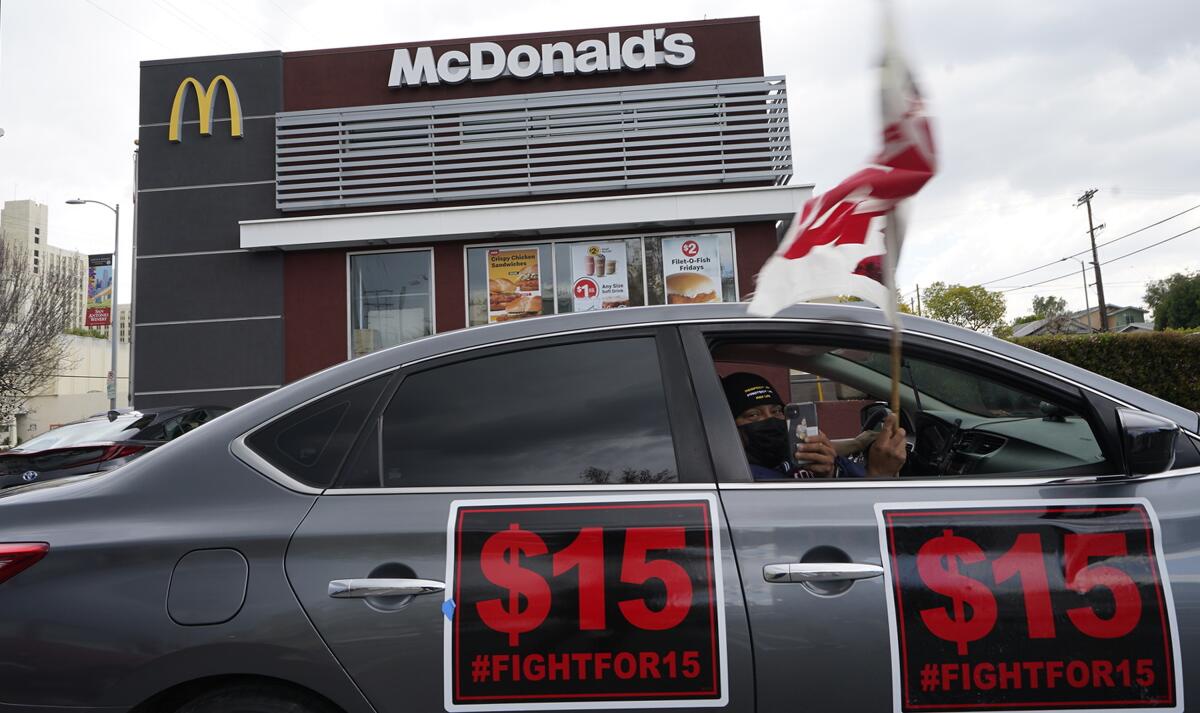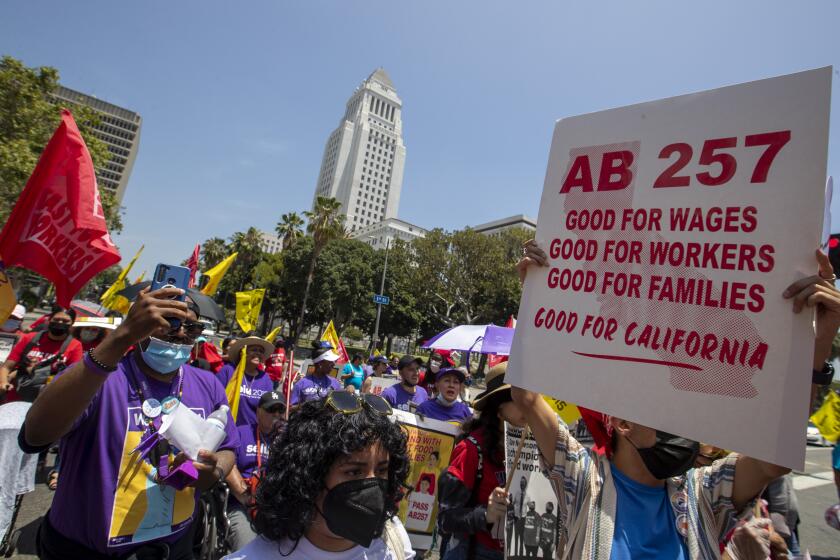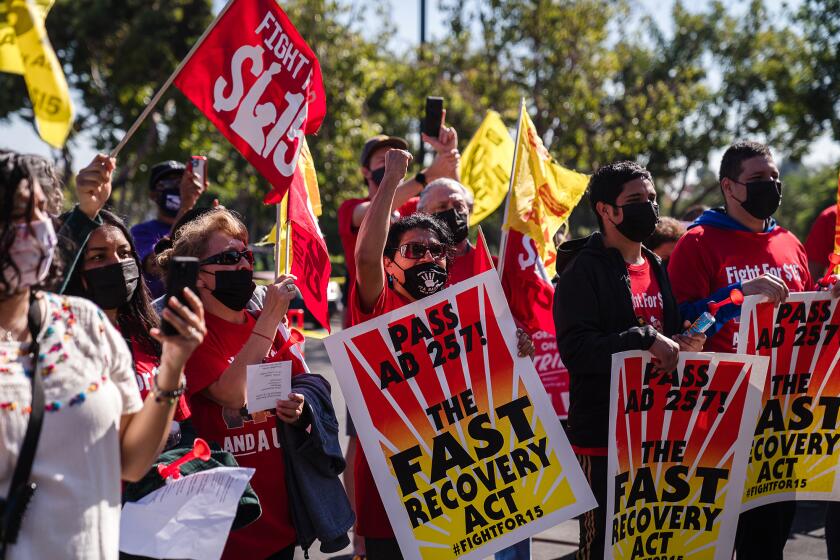A new law could raise fast-food wages to $22 an hour — and opponents are trying to halt it

- Share via
Almost as soon as the ink had dried on California’s new fast-food labor law, opponents set in motion an effort to overturn it.
A day after Gov. Gavin Newsom’s Labor Day signing of AB 257, which could raise the minimum wage for franchise restaurant workers as high as $22 next year, critics filed a referendum seeking to block it until the matter can be put before voters.
The law and the countermeasure have raised questions across one of the state’s largest industries. Here’s where things stand with the legislation, also known as the FAST Recovery Act, and the latest attempt to halt it.
Under the Fast Food Recovery Act, a council would be authorized to set the minimum wage and regulate working conditions for fast-food workers.
What is AB 257?
AB 257, also known as the Fast Recovery Act, creates a first-of-its-kind council of workers, corporate representatives, franchisees and state officials with a mandate to set minimum industry standards on wages, working hours and other conditions for fast-food workers statewide.
Proponents describe the experimental new system as a move to boost the power of workers who have little formal recourse for rampant wage theft and poor or unsafe conditions.
Who is against it, and why?
From the start, AB 257 faced heavy opposition from business trade groups, fast-food corporations and franchisees who argued it unfairly singled out the fast-food industry, would saddle operations with higher labor costs and would jack up food prices.
The California Restaurant Assn., California Chamber of Commerce as well as many local and regional business advocacy organizations sponsored the Stop AB 257 campaign. Chipotle, Yum Brands, Chick-fil-A Inc., In-N-Out Burgers, Jack in the Box Inc. and Burger King parent Restaurant Brands International Inc. spent money opposing the law.
Upward of $1.5 million went to lobbying against the bill after it was introduced last year, an estimate based on a review of lobbying disclosures with the state of California.
Since Newsom’s signing Sep. 5, the International Franchise Assn. and the National Restaurant Assn. have spearheaded the renewed effort to block AB 257 from taking effect. In a joint statement Wednesday, the groups said they aim to give voters an opportunity to reverse the law and prevent harm to California local businesses and consumers.
“As a result of backroom politicking, Governor Newsom has signed a lie into law and maligned all of California’s quick service small businesses and local franchisees as bad employers,” the International Franchise Assn. and the National Restaurant Assn. said in the statement. “AB 257 never should have been introduced, it never should have passed, and it never should have been signed into law.”
Does the law immediately raise the fast-food minimum wage?
No. The law creates a 10-person council of workers, union representatives, employers and state officials who will decide whether, when and by how much to raise minimum hourly wages for fast-food workers — up to a point.
The council has the authority to raise the minimum hourly wage for fast-food workers as high as $22 next year. That upper cap rises each year, based on inflation.
The council could choose not to raise wages, or decide to raise the minimum in smaller increments rather than jumping straight to $22. For reference, California’s current minimum wage is $15 an hour and is scheduled to increase by 50 cents next year.
AB 257 applies to people working at fast-food restaurants with at least 100 locations nationally.
The Fast Recovery Act heading for a vote in the California Senate would remake the franchise industry for the better.
Before any raising of fast-food wages can happen, labor groups must secure signatures of 10,000 fast-food restaurant employees approving the creation of the council. Then, the council’s representatives must be selected and appointed. Representatives from Service Employees International Union, a co-sponsor of the law, said signature gathering could start right away and they do not anticipate it being a difficult process.
The council is set to shut down at the end of 2028 unless it is renewed.
Aside from wages, what does AB 257 mean for workers?
Proponents of the law say the greatest benefit of AB 257 is giving fast-food workers a formal seat at the table, as well as more avenues to air recommendations and complaints.
The law holds that counties or cities with populations greater than 200,000 can establish local fast-food councils that can hear concerns and provide written recommendations to the statewide council.
The law also appears to create a pathway for workers who are retaliated against to be reinstated and compensated for lost wages or benefits as a result of being fired, having their hours reduced or other punishments through private legal action.
AB 257 could create more urgency for existing state health and safety agencies to provide oversight in the industry.
For example, at the forefront of safety issues fast-food workers in California face is extreme heat and the risk of experiencing physical violence by customers.
Establishing health standards to mitigate these issues — for example, mandating cooling units and minimum security measures — is the purview of the state worker safety agency, Cal/OSHA. The new council has the authority to petition that agency with recommendations, which the agency is obligated to consider and respond to within six months.
Does AB 257 matter outside of California?
In the U.S., bargaining typically happens at the “enterprise” level, where workers negotiate standards with an individual business.
AB 257 charts an alternative route. The statewide council it creates would engage in “sectoral bargaining,” meaning standards would be negotiated for multiple employers across the industry rather than with an individual business.
This type of bargaining could be transformative in the U.S., where union membership has been on a steady decline. It could be particularly useful in the fast-food industry, where collective bargaining is made even more difficult by franchise arrangements.
Many fast-food restaurants are not owned by the corporation whose name is on the sign but instead owned and operated as small businesses that pay royalties and are contractually bound to their corporate franchisers.
Both opponents and proponents of AB 257 have acknowledged the potential for the statewide council model of bargaining to be exported to other states. California often serves as both trailblazer and guinea pig.
Will AB 257 cause food prices to rise?
Yes. In general, minimum wage increases translate to price increases. But those associated increases are likely to be small, some economists say.
Opponents have repeatedly cited a report by Chris Thornberg of the UC Riverside School of Business’ Center for Economic Forecasting and Development that projects raising the fast food minimum wage to $22 would lead to a 20% increase in restaurant food prices.
For the record:
5:36 p.m. Sept. 12, 2022An earlier version of this story said a report by UC Riverside’s Chris Thornberg projected food price increases of 20% if the minimum wage for fast-food workers increased to $43 per hour. Thornberg said his report projected a 20% increase based on a $22 minimum wage, as well as other spillover costs and policy changes that could be brought on by a new fast-food sector council.
Michael Reich, a labor economist at UC Berkeley, projects a lower price increase of about 2.3%.
Reich said Thornberg’s simulation assumes that a minimum wage increase of, say, 20% would indiscriminately increase a firm’s labor compensation costs by the same proportion. But some fast-food firms already pay many of their workers above the existing minimum wage.
Reich argues a 47% increase of the minimum wage from $15 to $22 would increase labor compensation by a much smaller percentage — he estimates around 7%. With labor costs in fast food at about one-third of operating costs, Reich arrived at his 2.3% price increase calculation.
Thornberg said in an interview that simply raising the minimum wage to $22 alone would not cause the projected 60% increase in labor costs and 20% overall food price increase mentioned in his report. Rather, Thornberg said he meant to attribute the projected price hikes to spillover effects such as adjusting pay for higher paid associates and yet-to-be-determined costs or benefits the new council may also choose to mandate.
“They have a blank check to increase labor costs in many different ways, outside of the minimum wage,” Thornberg said.
Will the law cause jobs in fast food to disappear and hurt business?
Business interests say AB 257 could mean restaurant closures and an overall decline in fast-food industry employment. While employees who keep their jobs may enjoy elevated conditions, the higher costs of labor will cause the industry to shed jobs and establishments, fast-food industry representatives say.
Individual businesses may adjust hiring to reduce costs. But on the whole, Reich said he does not expect employment rates in fast food to shrink, based on his findings in a recent report on higher minimum wages’ effect on California employment rates. Reich said he compared California with Texas and found wages stagnated in both states from 2009 to 2014. After 2014, California wages rose rapidly while Texas wages remained stagnant — yet fast-food employment continued to grow in both states at the same rate.
Most laws can be expected to have some ripple effects, and it remains to be seen how major changes established by AB 257 will play out.
Blair Salisbury, owner of an El Cholo in Pasadena and former president of CRA’s Los Angeles chapter, has said he began working part time with a company called Daddy’s Chicken Shack. He is tasked with helping the company open a corporate location of the chain in Southern California and secure contracts for 19 franchise stores.
Salisbury said the company did not choose to pull its plans in the region, but he feels he has had less success securing contracts than his counterparts in other states.
What happens next?
AB 257 is set to take effect Jan. 1, but if the referendum qualifies, the law would be put on hold until voters can weigh in — which probably wouldn’t be until November 2024.
Qualifying a referendum involves a costly signature-gathering process. To appear on the November 2024 ballot, referendum backers would need to submit some 623,000 voter signatures by Dec. 4, or 90 days from the date of the enactment of the bill. It’s often necessary to collect more than the minimum number of signatures since some signatures may be deemed invalid.
The referendum could be an effective strategy to defeat AB 257, said Robert Stern, who studied the ballot measure process as former president of the Center for Governmental Studies.
“You can qualify almost anything if you have enough money,” Stern said.
Proponents of AB 257 sharply criticized the referendum effort in a Wednesday video news conference convened by the SEIU.
“This ballot measure isn’t going to stop us,” Angelica Hernandez said on the videoconference. Hernandez is a fast-food worker who has helped lead organizing efforts for the Fight for 15 movement, which has aimed to tackle sexual harassment and wage theft in the fast-food industry.
“It is saddening that the industry is looking for a way out,” the law’s author, Assemblyman Chris Holden (D-Pasadena) said in a written statement, describing the referendum as a costly effort to delay workplace solutions. “It is high time that we build up and engage the workers who make the multi-billion fast food industry possible.”
SEIU President Mary Kay Henry and others on the call said that although the coming battle was over a state law, it will set the stage for the future of fast-food workers across the U.S.
“This isn’t how companies act when they’re proud of their business model. It’s how they act when they’re terrified of their own workers and the power of collective action,” Henry said in a written statement.
California residents Steven McDermed and Amber Evans are listed in filings as proponents for the referendum. They are represented by Nielsen Merksamer, a political law and lobbying firm in Sacramento. Attorney Kurt Oneto of the firm did not respond to a request for comment.
The International Franchise Assn. and the National Restaurant Assn. in their Wednesday statement on the referendum effort said “it is only right” that California’s voters have a say in a piece of legislation widely “heralded as a massive step in the wrong direction.”
A spokesman from the state attorney general’s office said it will issue the title and summary for the measure, which referendum backers need to begin collecting signatures, by Sept. 16.
Times researcher Scott Wilson contributed to this report.
More to Read
Inside the business of entertainment
The Wide Shot brings you news, analysis and insights on everything from streaming wars to production — and what it all means for the future.
You may occasionally receive promotional content from the Los Angeles Times.













